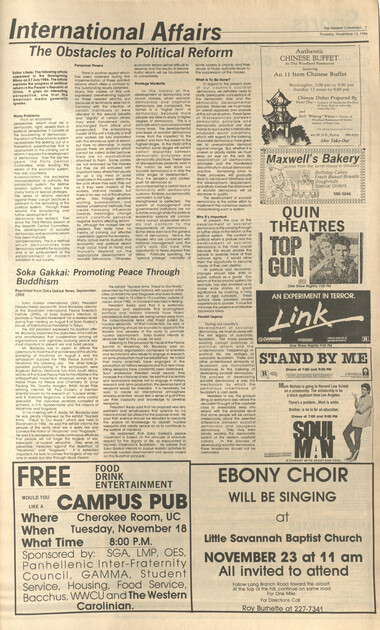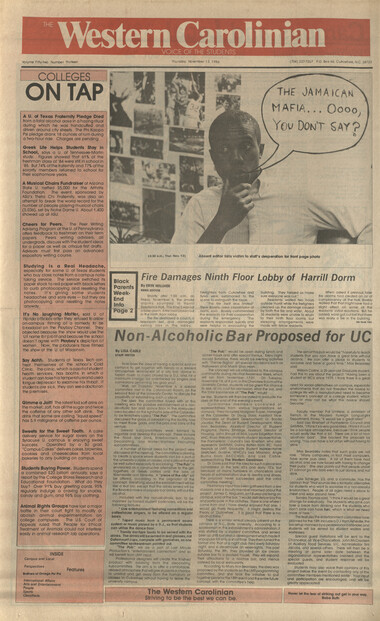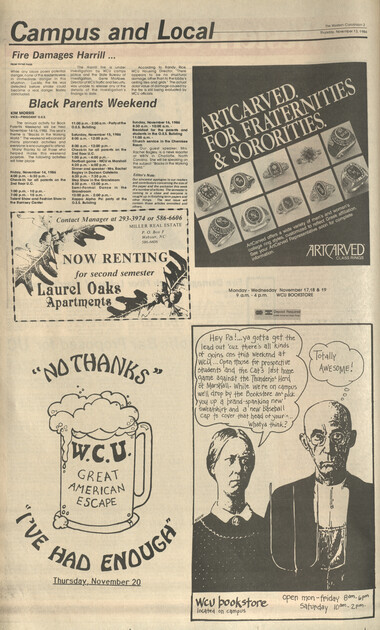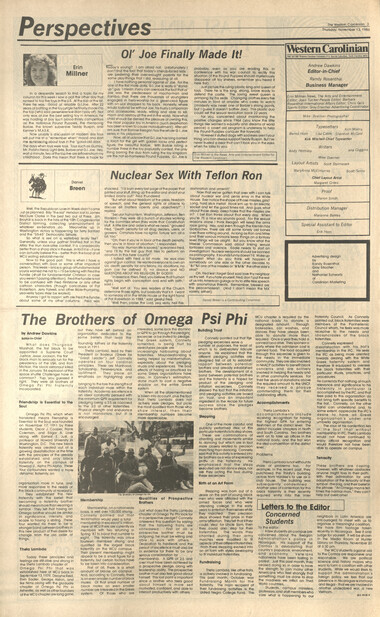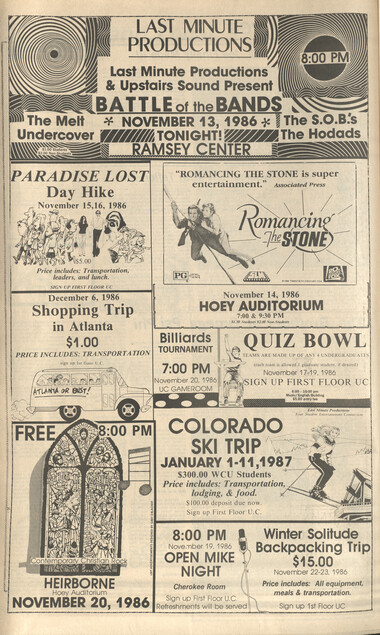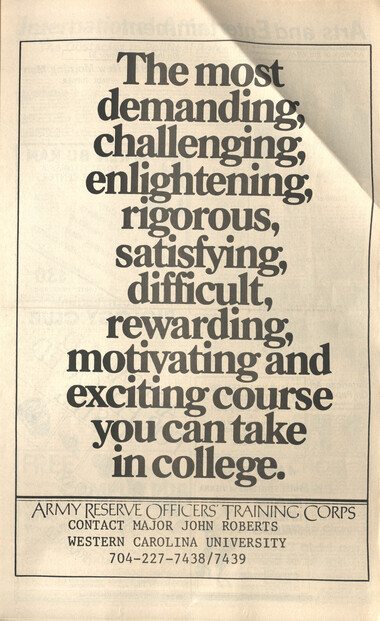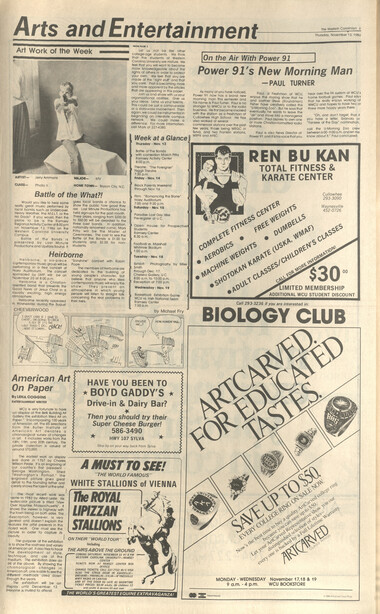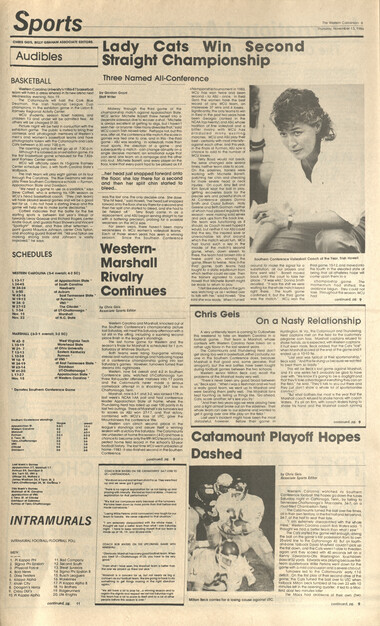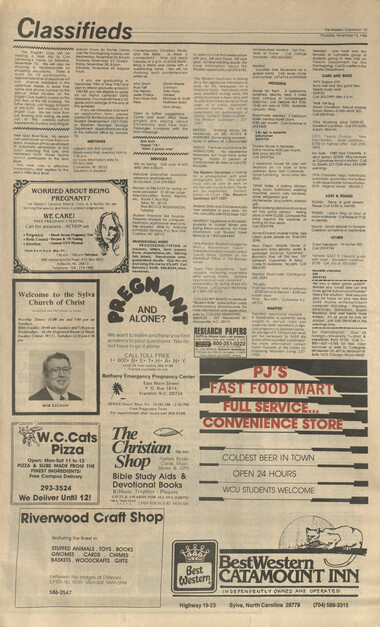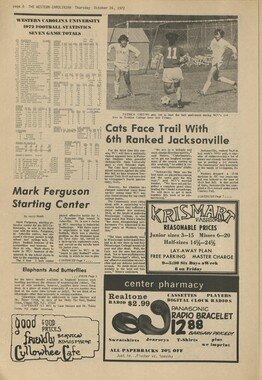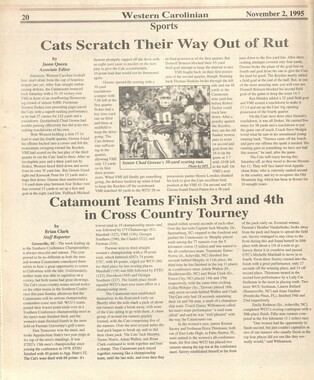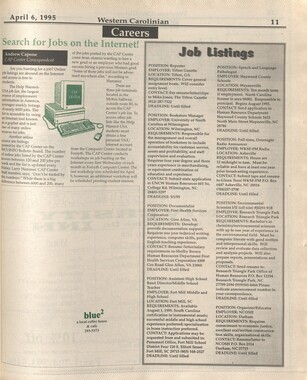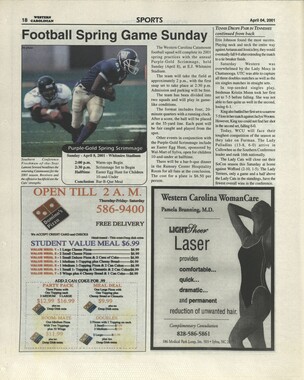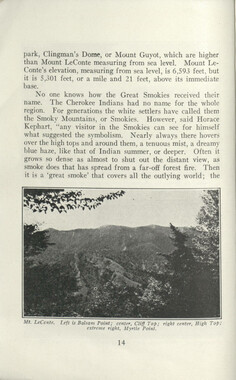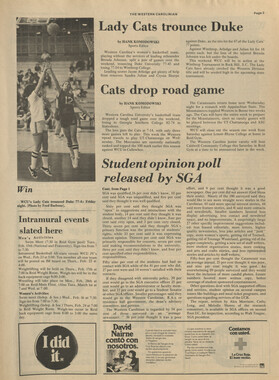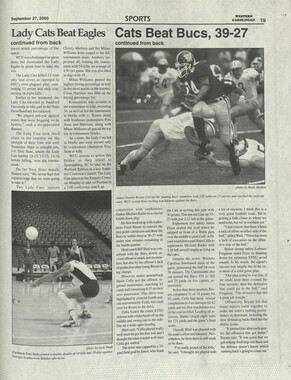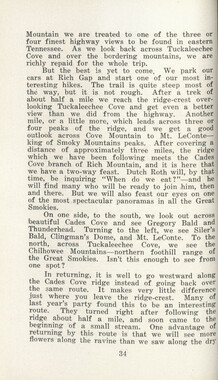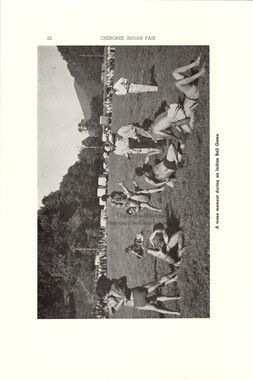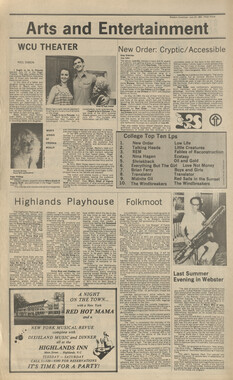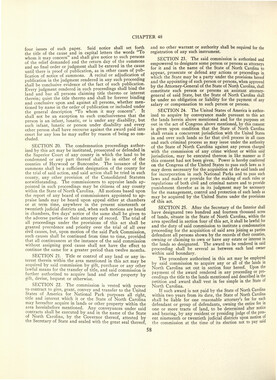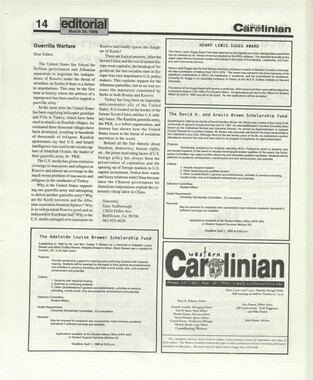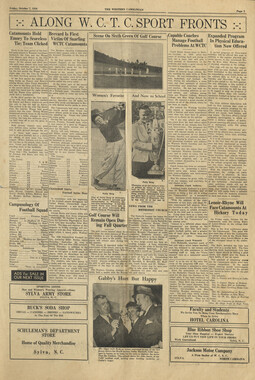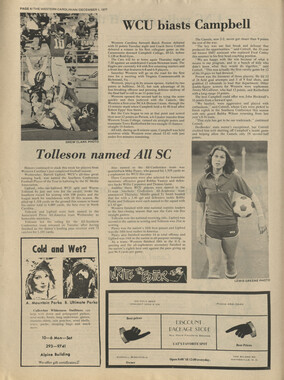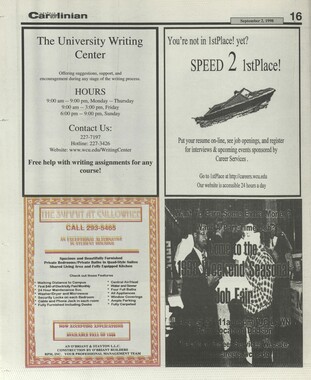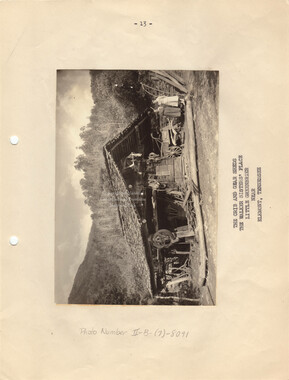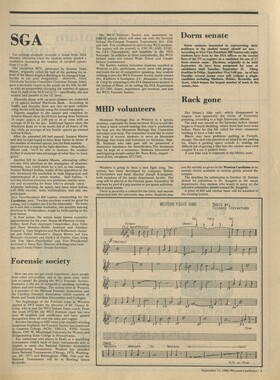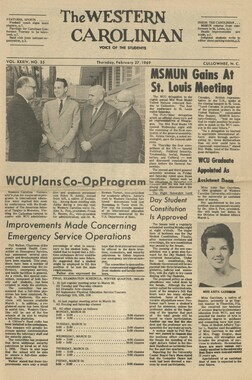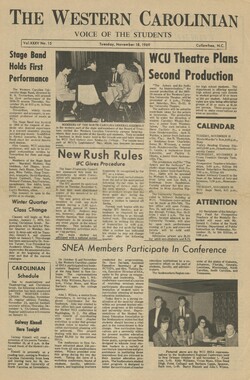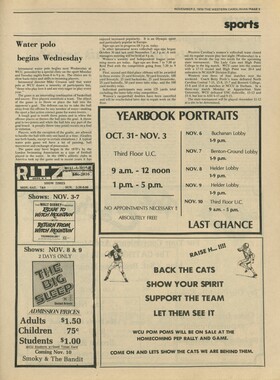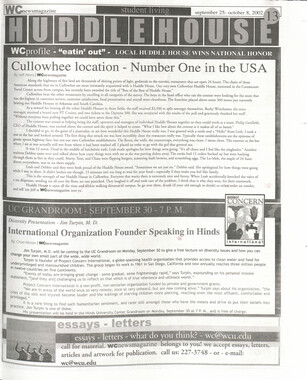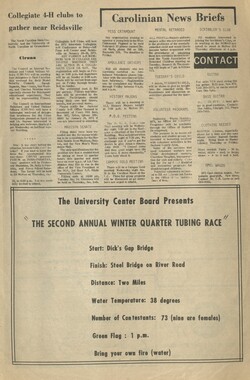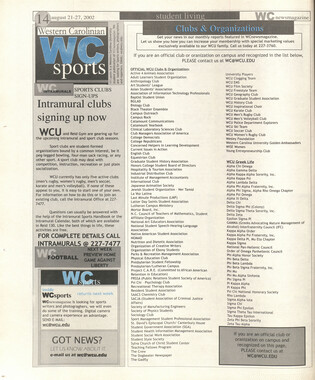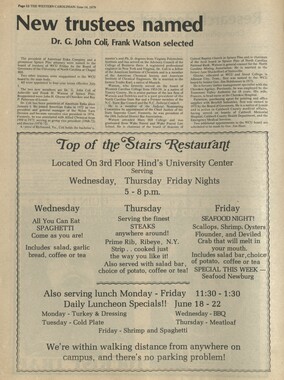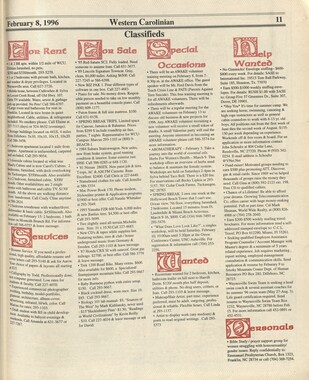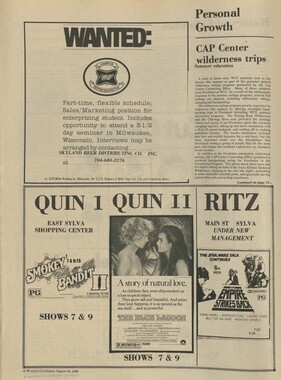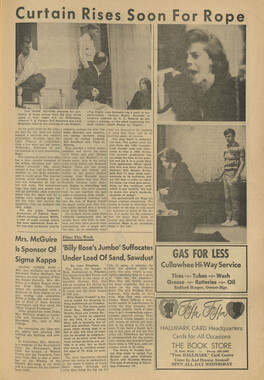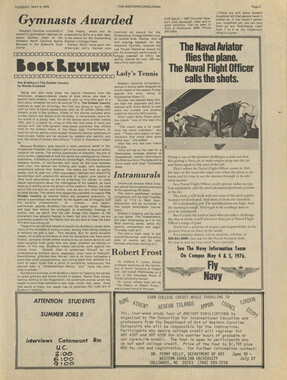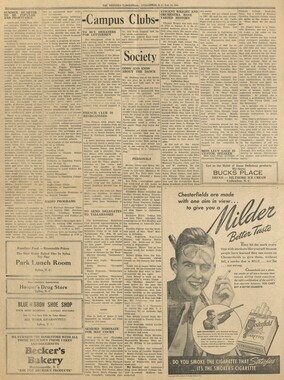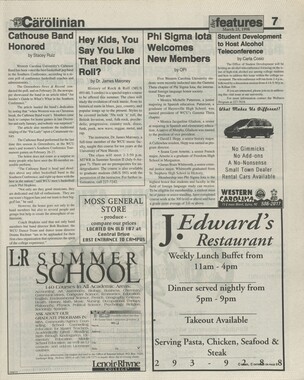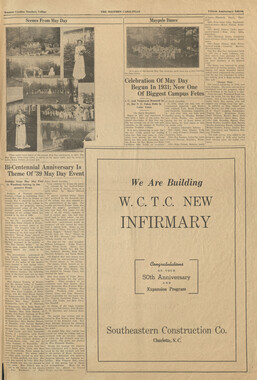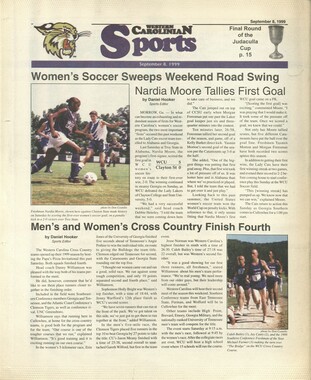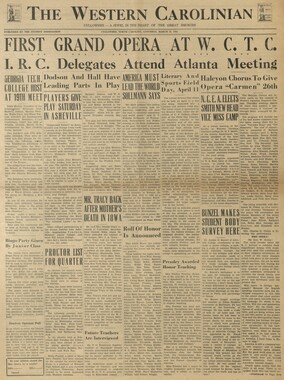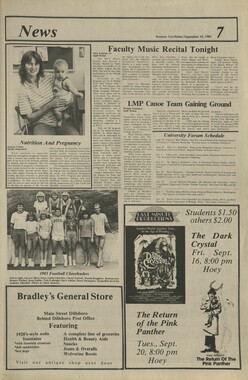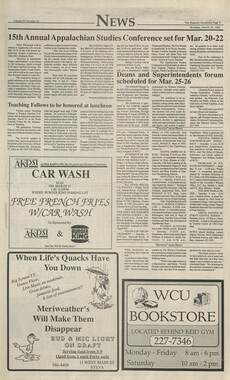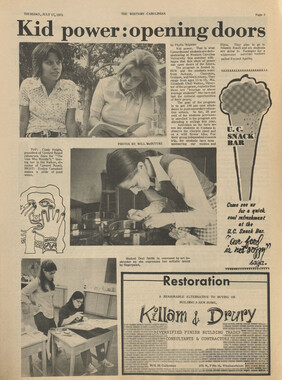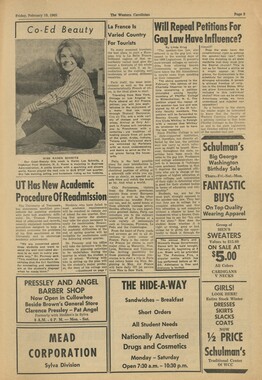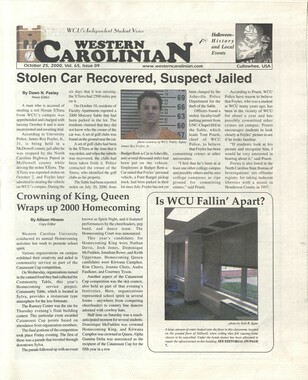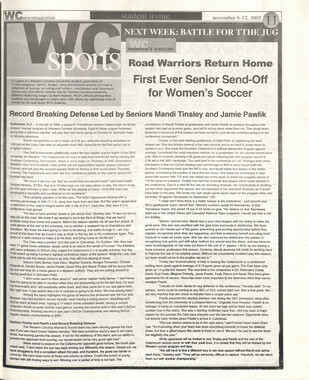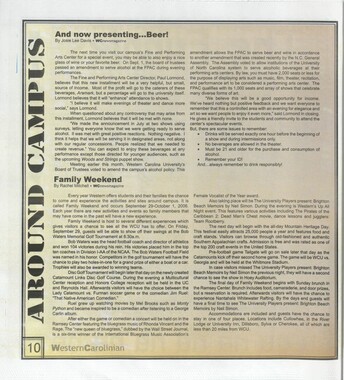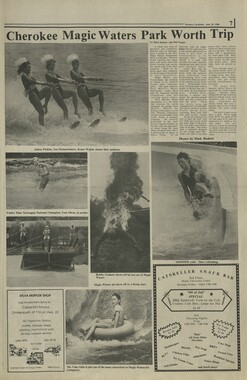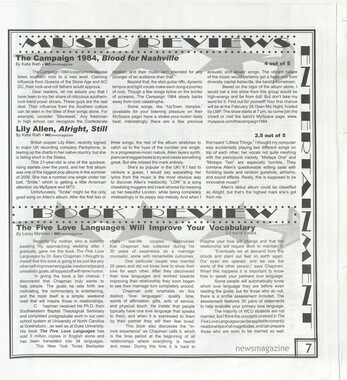Western Carolina University (20)
View all
- Canton Champion Fibre Company (2308)
- Cherokee Traditions (291)
- Civil War in Southern Appalachia (165)
- Craft Revival (1942)
- Great Smoky Mountains - A Park for America (2946)
- Highlights from Western Carolina University (430)
- Horace Kephart (941)
- Journeys Through Jackson (159)
- LGBTQIA+ Archive of Jackson County (85)
- Oral Histories of Western North Carolina (314)
- Picturing Appalachia (6873)
- Stories of Mountain Folk (413)
- Travel Western North Carolina (160)
- Western Carolina University Fine Art Museum Vitreograph Collection (129)
- Western Carolina University Herbarium (92)
- Western Carolina University: Making Memories (738)
- Western Carolina University Publications (2488)
- Western Carolina University Restricted Electronic Theses and Dissertations (146)
- Western North Carolina Regional Maps (71)
- World War II in Southern Appalachia (131)
University of North Carolina Asheville (6)
View all
- Allanstand Cottage Industries (62)
- Appalachian National Park Association (53)
- Bennett, Kelly, 1890-1974 (1463)
- Berry, Walter (76)
- Brasstown Carvers (40)
- Carver, George Washington, 1864?-1943 (26)
- Cathey, Joseph, 1803-1874 (1)
- Champion Fibre Company (233)
- Champion Paper and Fibre Company (297)
- Cherokee Indian Fair Association (16)
- Cherokee Language Program (22)
- Crowe, Amanda (40)
- Edmonston, Thomas Benton, 1842-1907 (7)
- Ensley, A. L. (Abraham Lincoln), 1865-1948 (275)
- Fromer, Irving Rhodes, 1913-1994 (70)
- George Butz (BFS 1907) (46)
- Goodrich, Frances Louisa (120)
- Grant, George Alexander, 1891-1964 (96)
- Heard, Marian Gladys (60)
- Kephart, Calvin, 1883-1969 (15)
- Kephart, Horace, 1862-1931 (313)
- Kephart, Laura, 1862-1954 (39)
- Laney, Gideon Thomas, 1889-1976 (439)
- Masa, George, 1881-1933 (61)
- McElhinney, William Julian, 1896-1953 (44)
- Niggli, Josephina, 1910-1983 (10)
- North Carolina Park Commission (105)
- Osborne, Kezia Stradley (9)
- Owens, Samuel Robert, 1918-1995 (11)
- Penland Weavers and Potters (36)
- Roberts, Vivienne (15)
- Roth, Albert, 1890-1974 (142)
- Schenck, Carl Alwin, 1868-1955 (1)
- Sherrill's Photography Studio (2565)
- Southern Highland Handicraft Guild (127)
- Southern Highlanders, Inc. (71)
- Stalcup, Jesse Bryson (46)
- Stearns, I. K. (213)
- Thompson, James Edward, 1880-1976 (226)
- United States. Indian Arts and Crafts Board (130)
- USFS (683)
- Vance, Zebulon Baird, 1830-1894 (1)
- Weaver, Zebulon, 1872-1948 (58)
- Western Carolina College (230)
- Western Carolina Teachers College (282)
- Western Carolina University (2005)
- Western Carolina University. Mountain Heritage Center (18)
- Whitman, Walt, 1819-1892 (10)
- Wilburn, Hiram Coleman, 1880-1967 (73)
- Williams, Isadora (3)
- Cain, Doreyl Ammons (0)
- Crittenden, Lorraine (0)
- Rhodes, Judy (0)
- Smith, Edward Clark (0)
- Appalachian Region, Southern (2569)
- Asheville (N.C.) (1923)
- Avery County (N.C.) (26)
- Blount County (Tenn.) (195)
- Buncombe County (N.C.) (1672)
- Cherokee County (N.C.) (283)
- Clay County (N.C.) (555)
- Graham County (N.C.) (236)
- Great Smoky Mountains National Park (N.C. and Tenn.) (519)
- Haywood County (N.C.) (3569)
- Henderson County (N.C.) (70)
- Jackson County (N.C.) (4909)
- Knox County (Tenn.) (35)
- Knoxville (Tenn.) (13)
- Lake Santeetlah (N.C.) (10)
- Macon County (N.C.) (420)
- Madison County (N.C.) (215)
- McDowell County (N.C.) (39)
- Mitchell County (N.C.) (132)
- Polk County (N.C.) (35)
- Qualla Boundary (982)
- Rutherford County (N.C.) (76)
- Swain County (N.C.) (2182)
- Transylvania County (N.C.) (270)
- Watauga County (N.C.) (12)
- Waynesville (N.C.) (86)
- Yancey County (N.C.) (72)
- Aerial Photographs (3)
- Aerial Views (60)
- Albums (books) (4)
- Articles (1)
- Artifacts (object Genre) (228)
- Bibliographies (1)
- Biography (general Genre) (2)
- Cards (information Artifacts) (38)
- Clippings (information Artifacts) (191)
- Copybooks (instructional Materials) (3)
- Crafts (art Genres) (622)
- Depictions (visual Works) (21)
- Design Drawings (1)
- Drawings (visual Works) (185)
- Envelopes (73)
- Exhibitions (events) (1)
- Facsimiles (reproductions) (1)
- Fiction (general Genre) (4)
- Financial Records (12)
- Fliers (printed Matter) (67)
- Glass Plate Negatives (381)
- Guidebooks (2)
- Internegatives (10)
- Interviews (815)
- Land Surveys (102)
- Letters (correspondence) (1013)
- Manuscripts (documents) (618)
- Maps (documents) (177)
- Memorandums (25)
- Minutes (administrative Records) (59)
- Negatives (photographs) (6090)
- Newsletters (1290)
- Newspapers (2)
- Notebooks (8)
- Occupation Currency (1)
- Paintings (visual Works) (1)
- Pen And Ink Drawings (1)
- Periodicals (193)
- Personal Narratives (10)
- Photographs (12976)
- Plans (maps) (1)
- Poetry (5)
- Portraits (4568)
- Postcards (329)
- Programs (documents) (181)
- Publications (documents) (2440)
- Questionnaires (65)
- Relief Prints (26)
- Sayings (literary Genre) (1)
- Scrapbooks (282)
- Sheet Music (2)
- Slides (photographs) (402)
- Songs (musical Compositions) (2)
- Sound Recordings (796)
- Specimens (92)
- Speeches (documents) (18)
- Tintypes (photographs) (8)
- Transcripts (322)
- Video Recordings (physical Artifacts) (23)
- Text Messages (0)
- A.L. Ensley Collection (275)
- Appalachian Industrial School Records (7)
- Appalachian National Park Association Records (336)
- Axley-Meroney Collection (2)
- Bayard Wootten Photograph Collection (20)
- Bethel Rural Community Organization Collection (7)
- Blumer Collection (5)
- C.W. Slagle Collection (20)
- Canton Area Historical Museum (2110)
- Carlos C. Campbell Collection (462)
- Cataloochee History Project (64)
- Cherokee Studies Collection (4)
- Daisy Dame Photograph Album (5)
- Daniel Boone VI Collection (1)
- Doris Ulmann Photograph Collection (112)
- Elizabeth H. Lasley Collection (1)
- Elizabeth Woolworth Szold Fleharty Collection (4)
- Frank Fry Collection (95)
- George Masa Collection (173)
- Gideon Laney Collection (452)
- Hazel Scarborough Collection (2)
- Hiram C. Wilburn Papers (28)
- Historic Photographs Collection (236)
- Horace Kephart Collection (861)
- Humbard Collection (33)
- Hunter and Weaver Families Collection (1)
- I. D. Blumenthal Collection (4)
- Isadora Williams Collection (4)
- Jesse Bryson Stalcup Collection (47)
- Jim Thompson Collection (224)
- John B. Battle Collection (7)
- John C. Campbell Folk School Records (80)
- John Parris Collection (6)
- Judaculla Rock project (2)
- Kelly Bennett Collection (1482)
- Love Family Papers (11)
- Major Wiley Parris Civil War Letters (3)
- Map Collection (12)
- McFee-Misemer Civil War Letters (34)
- Mountain Heritage Center Collection (4)
- Norburn - Robertson - Thomson Families Collection (44)
- Pauline Hood Collection (7)
- Pre-Guild Collection (2)
- Qualla Arts and Crafts Mutual Collection (12)
- R.A. Romanes Collection (681)
- Rosser H. Taylor Collection (1)
- Samuel Robert Owens Collection (94)
- Sara Madison Collection (144)
- Sherrill Studio Photo Collection (2558)
- Smoky Mountains Hiking Club Collection (616)
- Stories of Mountain Folk - Radio Programs (374)
- The Reporter, Western Carolina University (510)
- Venoy and Elizabeth Reed Collection (16)
- WCU Gender and Sexuality Oral History Project (32)
- WCU Mountain Heritage Center Oral Histories (25)
- WCU Oral History Collection - Mountain People, Mountain Lives (71)
- WCU Students Newspapers Collection (1920)
- Western North Carolina Tomorrow Black Oral History Project (69)
- William Williams Stringfield Collection (2)
- Zebulon Weaver Collection (109)
- African Americans (390)
- Appalachian Trail (35)
- Artisans (521)
- Cherokee art (84)
- Cherokee artists -- North Carolina (10)
- Cherokee language (21)
- Cherokee pottery (101)
- Cherokee women (208)
- Church buildings (189)
- Civilian Conservation Corps (U.S.) (111)
- College student newspapers and periodicals (2009)
- Dams (107)
- Dance (1023)
- Education (222)
- Floods (61)
- Folk music (1015)
- Forced removal, 1813-1903 (2)
- Forest conservation (220)
- Forests and forestry (1184)
- Gender nonconformity (4)
- Great Smoky Mountains National Park (N.C. and Tenn.) (181)
- Hunting (45)
- Landscape photography (25)
- Logging (119)
- Maps (83)
- Mines and mineral resources (8)
- North Carolina -- Maps (18)
- Paper industry (38)
- Postcards (255)
- Pottery (135)
- Railroad trains (72)
- Rural electrification -- North Carolina, Western (3)
- School integration -- Southern States (2)
- Segregation -- North Carolina, Western (5)
- Slavery (5)
- Sports (452)
- Storytelling (243)
- Waterfalls -- Great Smoky Mountains (N.C. and Tenn.) (66)
- Weaving -- Appalachian Region, Southern (280)
- Wood-carving -- Appalachian Region, Southern (328)
- World War, 1939-1945 (173)
Western Carolinian Volume 52 Number 13
Item
Item’s are ‘child’ level descriptions to ‘parent’ objects, (e.g. one page of a whole book).
-
-
International Affairs The Western Carolinian 7 Thursday, November 13,1986 The Obstacles to Political Reform Editor's Note: The following article appeared in the Guangming Ribao on 2 7 July 1986. The article explores the progress of political reform in the People's Republic of China. It gives an interesting perspective, one that the American media generally ignores. Many Problems From an economic perspective, reform must be a democratic right; viewed from a political perspective, it consists of the broadening of democracy. The reform of the economic system necessitates the seeking out of a theoretical superstructure that is appropriate to the carrying out of reform; it requires the development of democracy. Over the last few years, the Party Central Committee, while leading the reform of the economic system, has also countered bureaucratism, the excessive monopolization of authority, the patriarchal system, the lifetime position system, and even the many forms of special privileges. The series of reforms directed against these corrupt practices is pertinent to the remolding of the political system. Through these reforms the broadening and further development of democracy was realized. Ever since the Third Plenary Session of the Eleventh Central Committee, the development of socialist democracy and economic reform has been mutually complementary. This is a method which demonstrates how democracy benefits the economy and is an embodiment of the establishment of modern socialism in our country. Personnel Posers There is another aspect which has been observed during the implementation of these pointed reforms which offers a contrast to the outstanding results obtained. Many fine cadres of this unit expressed overwhelming support for these needed reforms, but because of sentiments were not in harmony with the intention of certain individuals or were offensive to the special benefits and "dignity" of certain others, they were transferred away, discharged from office and prosecuted. The enterprising master of this unit's majority of staff and workers are fully dissatisfied with this erroneous spirit of reform, but have no alternative. In many places there are positions which cannot be called duties because there are no reponsibilities attached to them. Some cadres are not endorsed by the masses but they are still entrusted with important tasks, where they usually stir up a big mess or poke loopholes in the system. Within the few units where they exist, they act as if they were masters of the workers, staff.and masses, but there is no way out of this situation either. Also, through secretive plotting, bureaucratism, and related underhand methods, they create harassing influences towards meaningful change which constitute pervasive negative factors affecting reform. So, although the masses are not pleased, they really have no means of carrying out effective supervision against this tendency. Many actual events illustrate that economic and political reform must occur hand in hand and mutually depend on the appropriate development of socialist democracy. Otherwise, economic reform will be difficult to develop and the results ot already fruitful reform will be troublesome to consolidate. Privilege Mentality In the history of the development of democracy and social classes, when socialist democracy and capitalist democracy are compared, the former is a "higher form" of democracy because more people are able to enjoy a higher degree of democracy. This is a principle which Lenin propounded many times. The developmental processes of socialist democracy move from the imperfect to the perfect and from the lowest to the highest stages. In the midst of this transition some stages will exhibit certain disparities between democratic principles and democratic practices. These types of discrepancies presently exist in this nation as well since our socialist democracy is in only the initial stages of development. Thus, the people's, and cadres' push for democrac is/ accompanied by a certain lack of familiarity with democratic customs. Similarly, ourdemocratic centralism is not fullyu strengthened or perfected. The system of management and governmental institutions are not suitable enough while the political leadership systems still contain many corrupt propensities which do not conform to the requirements of democracy. Some areas even lack the general form of democracy. Hence, the masses who are concerned with national management and this unit's work still have little opportunity to freely express their ideas. Politically speaking, the "special privilege" mentality of Soka Gakkai: Promoting Peace Through Buddhism Reprinted from Soka Gakkai News, September, 1986 Soka Gakkai International (SGI) President Daisaku Ikeda assured Mr. Frank Blackaby, director of the Stockholm International Peace Research Institute (SIPRI), of Soka Gakkai's intention to promote a "forceful movement" for a warless world during their meeting on August 8 at Soka Gakkai's House of International Friendship in Tokyo. The SGI president expressed his position after Mr. Blackaby explained the objectives of his institute and emphasized that cooperation among all organizations and agencies pursuing peace was most important to prevent war and build peace. Mr. Blackaby was in Japan to attend the ceremony to mark the 41st anniversary of the atomic bombing of Hiroshima on August 6 and the symposium dubbed the 1986 Peace Summit in Hiroshima the following day. The other foreign panelists participating in the symposium were Anglican Bishop Desmond Tutu from South Africa, winner of the Nobel Peace Prize for his initiative in the antiapartheid movement; American winner of the Nobel Prizes for Peace and Chemistry Dr. Unus Pauling; Ms. Dorothy Hodgkin, British Novel Prize winning chemist, Mr. Paul Crutzen, a German scientist known for his research on "nuclear winter;" and R. Radomir Bogdanov, a Soviet arms control specialist. The Japanese panelists consisted ot scholars, a U.N. representative and the mayors of Hiroshima and Nagasaki. In his meeting with R. Ikeda, Mr. Blackaby said he was greatly impressed by the exhibit "Nuclear Arms: Threat to Our World," which was held in Stockholm in 1984. He said the exhibit informs the people of the world what war is really like and conveys the horror of "Hiroshima" and "Nagasaki." He said it is necessary to make continuous efforts so that people will not forget the tragedy of war, especially ■ of nuclear weapons. They serve as preventive measures against the repetition of "Hiroshima" and "Nagasaki." It is extremely important, he said, to convey the tragedy of war not only in words but also through visual means. The exhibit "Nuclear Arms: Threat to Our World," presented by the United Nations with support of the cities of Hiroshima and Nagasaki and Soka Gakkai, has been held in 15 cities in 12 countries, outside of Japan, since 1982. In October it was held in Beijing. President Ikeda said that it is extremely dangerous and deplorable that short-sighted political and military interests have taken precedence and eyes are being turned away from the indescribeable terror and threat posed by nuclear weapons. In that connection, he said, a strong warning should be sounded to appeal to the leaders and peoples of the world to promote nuclear disarmament. Soka Gakkai intends to dedicate itself to this cause, he said. Referring to the proposal he made at the Peace Summit in Hiroshima, Mr. Blackaby said an international organization composed of scientists and technicians who refuse to engage in research on arms production must be established. He noted that many scientists have engaged in the production of military weapons and that new mass- killing weapons have constantly been developed. Such endeavors threaten world peace; they increase the chances of war. He said that if scientists and technicians resolve not to engage in military research and arms production, the development of weapons would be checked. It is necessary, he said, to create an international atmosphere whereby scientists would feel a sense of guilt if they use their capacity and knowledge to develop weapons. President Ikeda said that his proposal was very pertinent and emphasized that science by no means should be utilized for the purpose of war. He said that science should be elevated to become the source of knowledge to abolish nuclear weapons and create peace so as to contribute to the welfare of mankind. He explained that Soka Gakkai's peace movement is based on the principle of absolute respect for the dignity of life, as expounded in Nichiren Daishonin's Buddhism. He added that Soka Gakkai intends to pursue realistic activities to promote nuclear disarmament and peace, based on this Buddhist principle. FREE FOOD DRINK ENTERTAINMENT WOULD YOU LIKE A CAMPUS PUB Where Cherokee Room, UC When Tuesday, November 18 What Time 8:00 p.m. Sponsored by: SGA, LMP, OES, Panheilenic Inter-Fraternity Council, GAMMA, Student Service, Housing, Food Service, Bacchus, WWCU and The Western Carolinian. some cadres is chronic and their abuse of titular authority leads to the suppression of the masses. What Is To Be Done? In regard to the present state of our country's socialist democracy, we definitely need to clarify prerequisite conceptions of the democratic style and the democratic developmental process. Moreover, we must make an overall appraisal and analysis of the actual situation. These types of discrepancies between democratic principle and democratic practice are due mainly to our country's historically- produced social conditions, which, with regard to the fostering of socialist democracy, have given rise to unreasonable demand against change. But, whether it is unseen or plainly visible, we must keep an eye on the real life application of democratic principles and the manifested discontinuity in actual democratic practice. Remaining blind to these processes will gradually lead to permanent blindness and the development, requirement, and efforts towards the attainment of socialist democracy will all decrease in quality. The development of socialist democracy is the active effort to implement the numerous aspects characterizing such a system. Why If s Important At present, the crux of the development of socialist democracy is the carrying through of further steps in the reform of the political system. The content of political reform is profuse and the development of socialist democracy is the most crucial because this would enable the people to exercise more of their national rights. It would allow them the opportunity to become master ot their own destiny. All political and economic changes should take shifts in public outlook as a guide. Our reform of the economic system, for example, has also enabled us to make wide strides of great significance by crushing a long line of rigid concepts. These actions have provided ample experiences to ponder. It must first minimize the presence of inflexible backward ideas. Feudal Legacy During our country's development of socialist democracy, we must do away with the evil legacy of autocratic feudalism. The many presently existing corrupt practices in political reform and the undemocratic happenings in political life, are vestiges of autocratic feudalism. These and other unmentioned remnants of feudalism are monumental hindrances to the fostering of developing socialist democracy. The process of developing socialist democracy is also the mechanism by which the pernicious inheritance of feudalism is cast aside. Needless to say, the gradual lifting of restrictions also allows the decadent thought of the capitalist class to enexorably seep into reform, with the probable result that some people will be unclear intellectually about the essential difference between socialist democracy and bourgeois democracy. They may even blindly worship the democratic system of the western capitalist nations. In the process of developiung socialist democracy, these tendencies should not be overlooked. Authentic CHINESE BUFFET At The Woodland Restaurant featuring An 11 Item Chinese Buffet Weeknights, 5:00 pm to 9:00 pm Sunday 12 noon to 9:00 pm Chinese Dishes Prepared Efy Peter Chu — formerly of Mandarian Pavilion cy Great Wall of Asheville, Asheville, NC and Earl '"Wilsong" Wilson — Owner of Woodland Restaurant 6/ former student of Peter Chu. (Also offering American food off menu) 441 & 23 S., Sylva 586-4331 Also Take-Out Maxwell's Bakery - ^across from the Jarret House in Dillsboro < wm^ Birthday Cakes Fresh Baked Breads Doughnuts ■Special Orders 586-5046 QUIN THEATRES P£, i®k One Show Nightly 9:00 PM STAND BY ME Shows at 7:00 and 9:00 PM , vsrs: Mark Watson is going to Harvard Law School on a scholarship. The scholarship is for a black applicant from Los Angeles. There's a problem...Mark is white. Brother, is he in for an education. Shows at 7:00 and 9:00 PM A COMEDY WITH HEART AND SOUL. EBONY CHOIR WILL BE SINGING at Little Savannah Baptist Church NOVEMBER 23 at 11 am All invited to attend Follow Long Branch Road toward the airport. At the top of the hill, continue on same road For One Mile. For Directions Call Roy Burnette at 227-7344
Object
Object’s are ‘parent’ level descriptions to ‘children’ items, (e.g. a book with pages).
-
The Western Carolinian is Western Carolina University's student-run newspaper. The paper was published as the Cullowhee Yodel from 1924 to 1931 before changing its name to The Western Carolinian in 1933.
-
